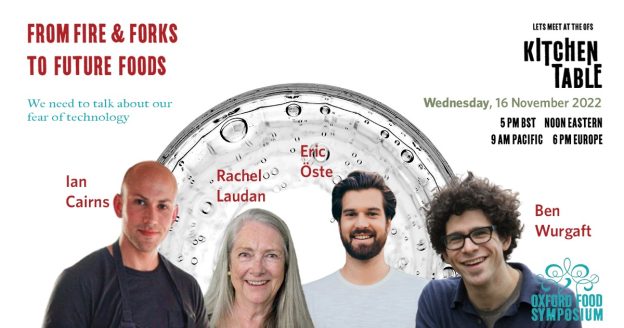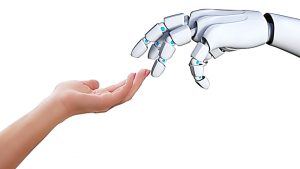
From Fire and Forks to Future Foods:
We need to talk about...
Our Fear of Technology

Food systems we live in have always been innately technological, even if not futuristic, going back to the flint knives and counting stones of the neolithic era, from the taming of fire, to designing the fork.
Seeing the futuristic plans of the food industry employing biotechnology makes many of us uneasy, in fact concerned of the myriad ways we are bending our minds and tools. While many of the technologies are imperative to secure food for our future, many more are designing food experiences never before conceived or tasted, in pursuit of protein and flavor. This Kitchen Table dares not to ask, 'What would you like for the future of food', rather 'What does the future of food mean to you, mean to us? And we hope you will join us around our virtual table.
Vision setting this conversation, Rachel Laudan asks, 'What is like to live in a technological food system?' There is something important about industrial food systems as we rely on industry to produce food for the planet. As she wrote in her 2001 essay 'A Plea for Culinary Modernism: Why We Should Love Fast, Modern, Processed Food', Our food system is not perfect, and we should work to make it better, but imagining that it ever was, or can ever be, perfect is also a mistake.
Rachel Laudan is author of Cuisine and Empire: Cooking in World History (University of California Press, 2013). Raised on an English farm, she received her Ph.D. in history and philosophy of science from University College London. Following a productive academic career, she turned to food history and politics.
Ben Wurgaft, author of Meat Planet: Artificial Flesh and the Future of Food, asks us to see how the food on our tables is already technological in many ways. A futuristic technology with bio reactors to ferment coffee, that keeps you from needing a civet cat to produce civet cat-fermented coffee, he says, is not a conversation of whether or not we want to eat bio-engineered civet-cat products, rather about how is your life with food is technological in someway and how does thinking about that enrich your experience? As a humanist and ethnographer Ben is asking inconvenient questions to people involved in technology and enterprise - why is new technology important and why do we need it?
Ian Patrick Cairns, aka "ian peas and carrots", former OFS Young Chef Grants Awardee, is a chef and culinary scientist with eleven years of experience working at Noma, Alinea, and The French Laundry. Currently, Ian is an MBA candidate at Cornell University studying the intersection of food systems and sustainability while building a venture that increases the accessibility of healthy plant-based eating.
Eric Öste is the co founder of Cirkulär AB, based in Sweden, where he uses cell-based biotechnologies to optimize food waste in a circular, impactful approach. One of the first challenges Cirkular is tackling is "waste-to-protein", rooting their lab work in the challenges of small farmers and producers. Guided by the Scandinavian intellectual ethos of putting people first, Eric believes in the creative potential of science for people and sustainability.

This event will take place on Zoom.
